81 F. average high for August 17.
81 F. high on August 17, 2011.
50 F. low Friday morning, coolest reading in the Twin Cities since May 31.
33 F. at Embarrass, Minnesota Friday morning.

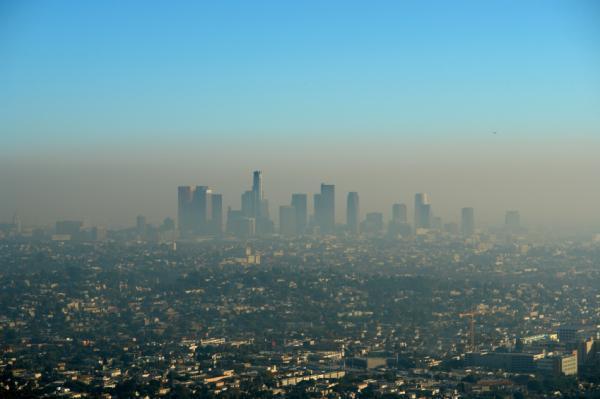
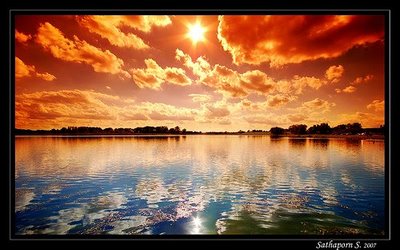
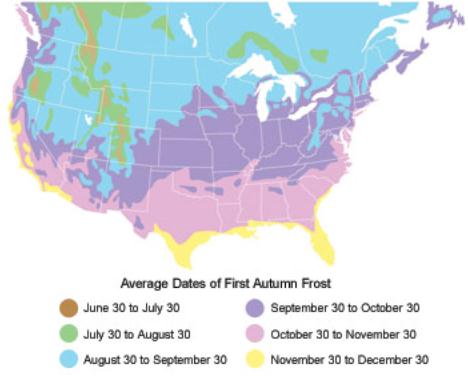
First (Average) Frost. Much of central and northern Minnesota experiences the first frost of the season by September 30, but temperatures don't usually dip below 32 F. in the metro until the first or second week of October. Most of the southern USA remains frost-free until mid November.
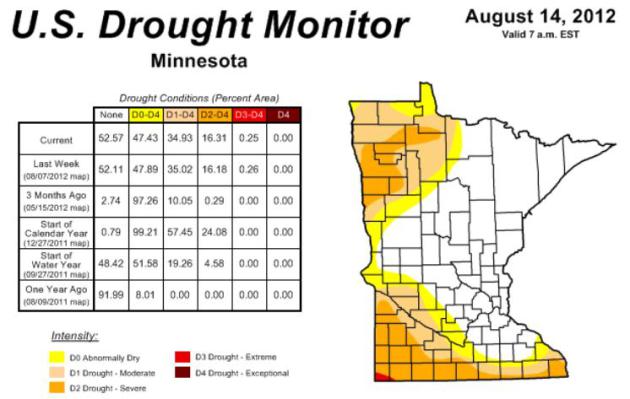
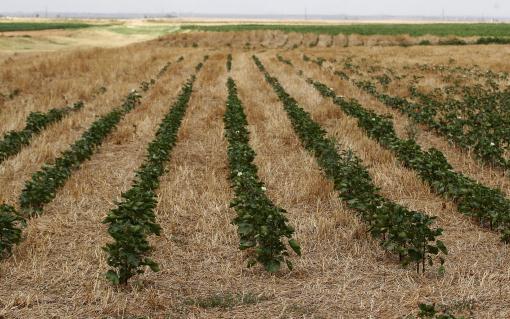
Photo credit above: "Cotton plants out of the range of an irrigation machine are pictured in Hydro, Okla, Thursday, Aug. 16, 2012. Drought conditions across Oklahoma have expanded and worsened despite recent rainfall in the state, according to the U.S. Drought Monitor report released Aug. 16, 2012." (AP Photo/Sue Ogrocki)


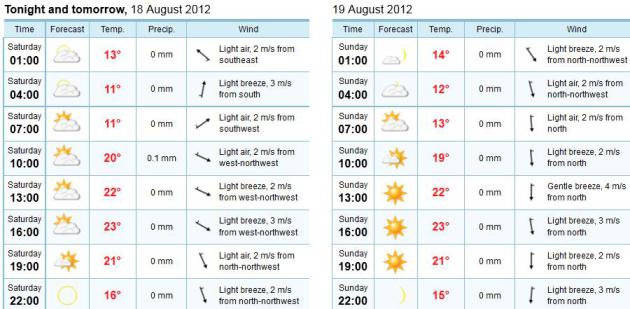
Weekend Details: Meteogram.
Temperatures today and tomorrow will be comparable; highs mostly in the
mid 70s with low dew points. Expect a light northwest breeze today, the
best chance of a shower later this afternoon north of Lake Mille Lacs.
Sunday looks drier and a bit sunner with a light north breeze.
Temperatures are in Celsius, by the way. No cause for panic.
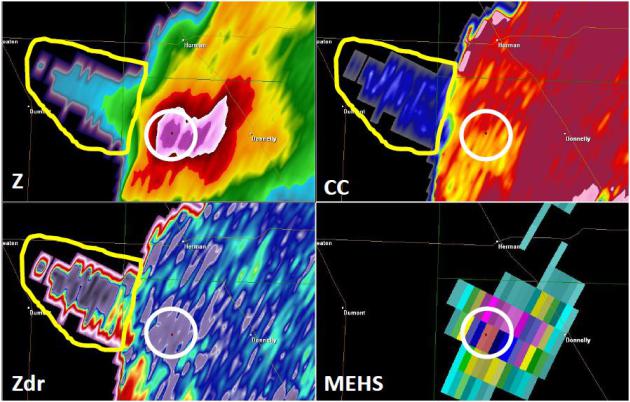
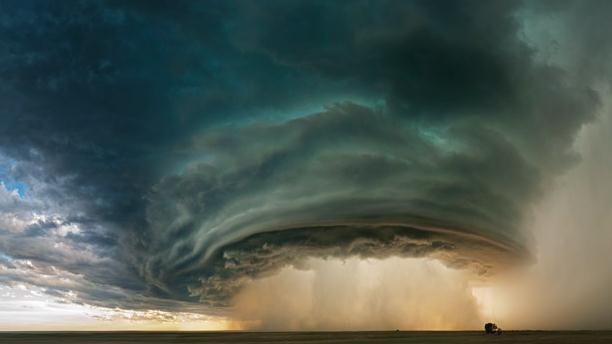
Photo credit above: "Supercell thunderstorm near Glasgow, Montana." Photograph by Sean R. Heavey, Barcroft Media/Landov.
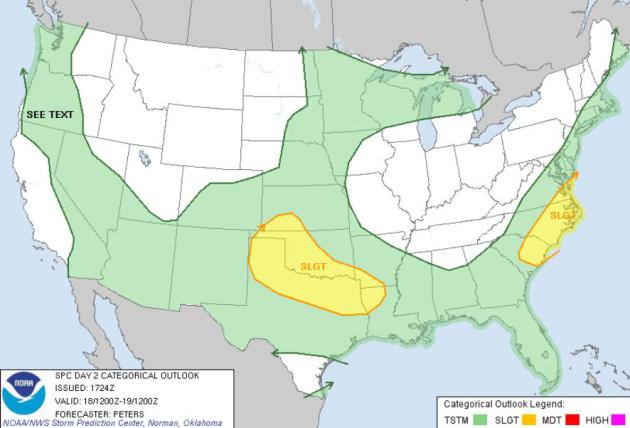
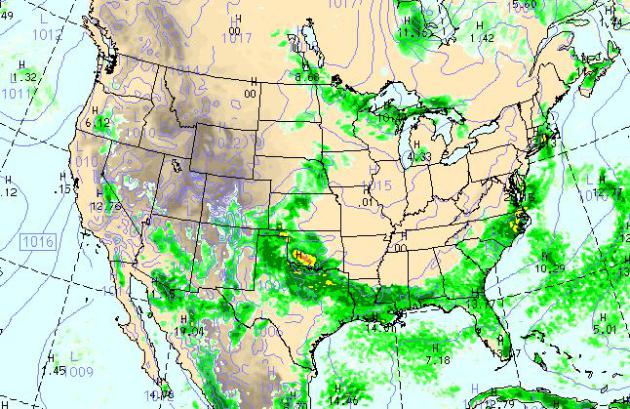
Best photos from Friday around the USA:
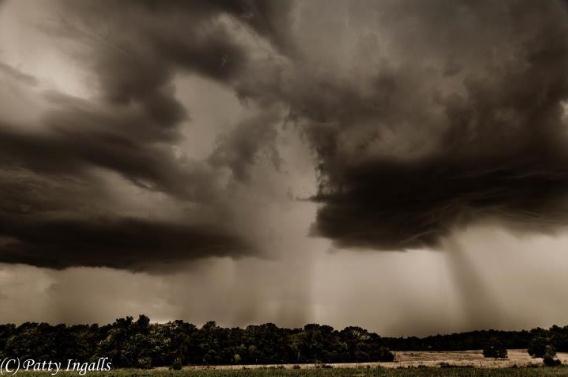
A Turbulent Sky. Thanks to Payy Ingalls for sharing this terrific photo; details: "I
took this photo, today, 8/16/12 in West Plains, MO (Howell County) at
approximately 4:15 p.m. We had a severe thunderstorm warning. :)"
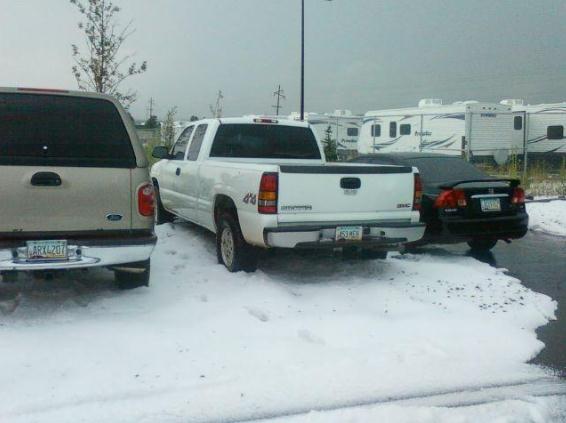
Hail And High Water. Brandon Wyatt snapped this photo in Bellemont, Arizona Friday. Monsoon season brings torrential rains, an occasional haboob, and plenty of hail: "Crazy thunderstorm in Bellemont AZ. Dropped a lot of hail."
.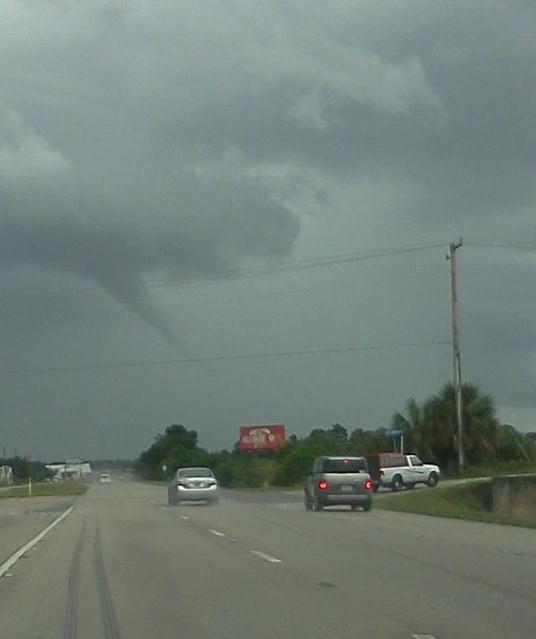
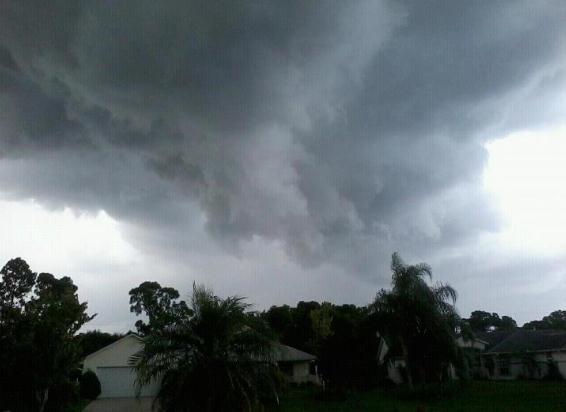
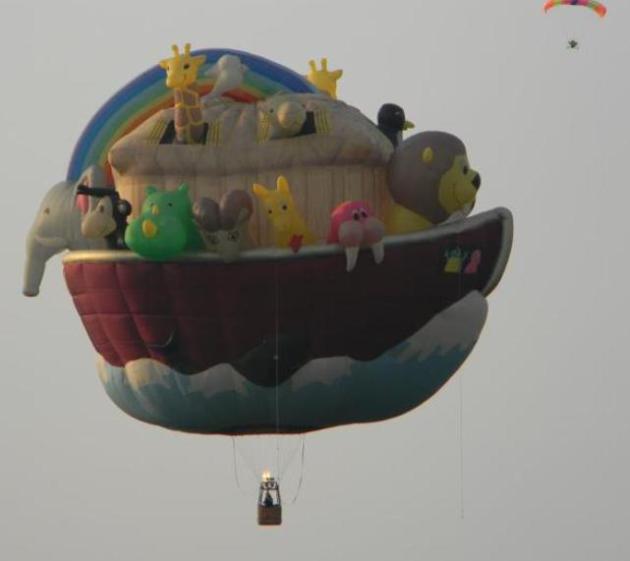
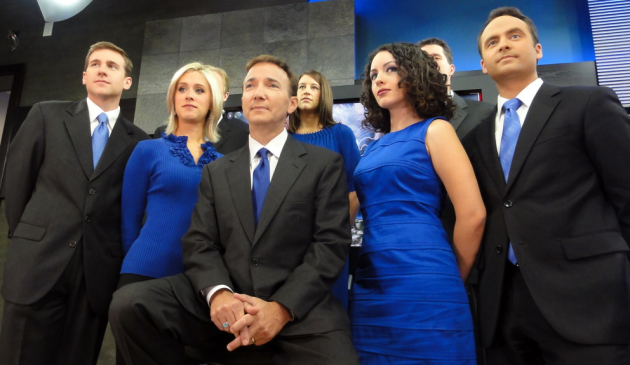
Subject: Hurricanes, cyclones and tornadoes
Sent from my iPad
Paul:
What is the difference between these three types of storms?
Laurie Auger
Andover
Sent from my iPad
Paul:
What is the difference between these three types of storms?
Laurie Auger
Andover
Laurie - it can get
confusing, I grant you that. Hurricanes (called cyclones in the Indian
Ocean) are huge storms that form over warm oceans, gathering their
strength from warm ocean water. They literally starve to death and
fizzle once they pass over land. They can be 400 miles in diameter, last
days, even weeks, with sustained winds near the "eye" from 74-160 mph.
All storms were called "cyclones" up until roughly the 1950s, any area
of low pressure. Tornadoes were also called cyclones up until the mid
50s, when warnings were first issued by government forecasters.
Tornadoes form under rapidly spinning (severe thunderstorms), brief,
violent whirlwinds that last 5-15 minutes on average, and affect a tiny
percentage of any given county. You don't hear the expression
"cyclone" much any more; most meteorologists refer to these broad,
500-100 mile wide systems as storms or low pressure systems. Thanks for a
good question!

Malaysia:
The Driver is jailed and if married, his wife is jailed too. (if this was in the US, it could explain the high divorce rate 
South Africa:
A 10 year prison sentence and the equivalent of a $10,000 fine.
Turkey:Drunk drivers are taken 20 miles outside of town by police and are forced to walk back under escort
Norway:
Drunk drivers are automatically jailed for 3 weeks at hard labour coupled with a license suspension for one year. Second offence within five years – license revoked for life.
Finland & Sweden:
Automatic jail for one year of hard labor.




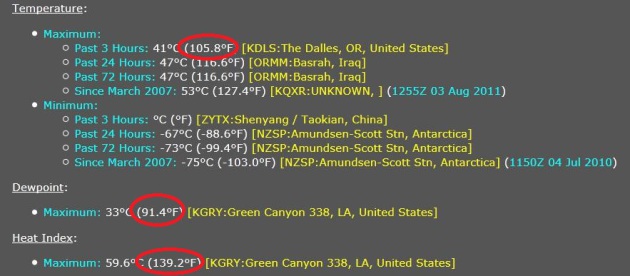
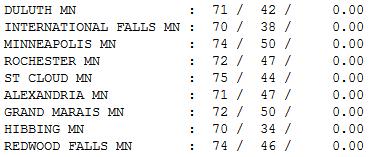

Paul's Conservation Minnesota Outlook for the Twin Cities and all of Minnesota:
SATURDAY: Plenty of sun morning and midday hours; PM shower or T-shower. Winds: W/NW 5-10. High: 76
SATURDAY NIGHT: Evening shower, then partial clearing. Low: 54
SUNDAY: Plenty of sun, still comfortable. Dew point: 49. High: 74
MONDAY: Sunny and milder. Low: 56. High: 77
TUESDAY: Warm sun, more humid. Dew point: 59. Low: 59. High: 83
WEDNESDAY: Sunshine, feels like summer! Low: 64. High: 86
THURSDAY: Hazy sun, sticky again. Dew point: 63. Low: 66. High: 88
FRIDAY: Hints of July. Sunny and hot. Low: 68. High: near 90
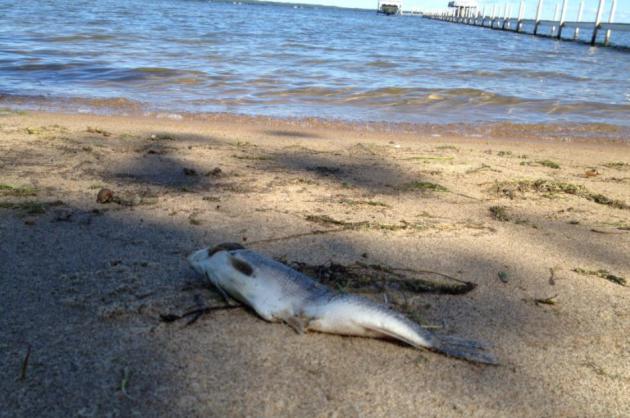
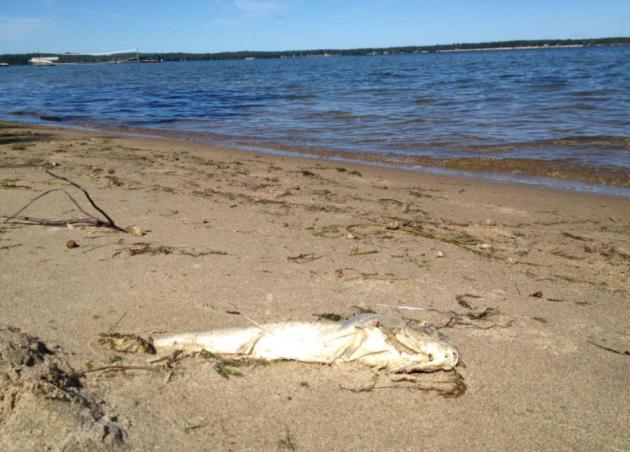
Toasty Lakes
I'm up at my cabin north of Brainerd, and dead
walleye are washing up onto our shoreline; something I've never seen
before. Why? Neighbors tell me its because of record warm lake water
temperatures and less oxygen. Yesterday the lake was still 10-15 degree
warmer than the air. Odd for mid-August.
Are you fond of the idea of a warmer Minnesota?
Sounds pretty good to me too, until you realize it probably means (more)
invasive species - as well as more beetles, bugs and pests that can
survive yearround.
A warmer sky isn't killing millions of acres of trees out west. Bark Beetles are taking a steep toll on western forests.
I worry about the BWCA. And every time I gaze
out over the water I wonder if it's going to still be this nice for my
grandkids, and yours.
A sunny start gives way to an instability shower or T-shower this afternoon, ahead of a weak, reinforcing puff of Canadian air.
Aside from a few (predictable) PM showers today,
it's a dry forecast into next week - the pattern not ripe for
significant rain.With a sun angle as high as it was in late
April, the odds of record heat are fading fast. But highs approach 90 by
the end of next week.
Climate Stories...

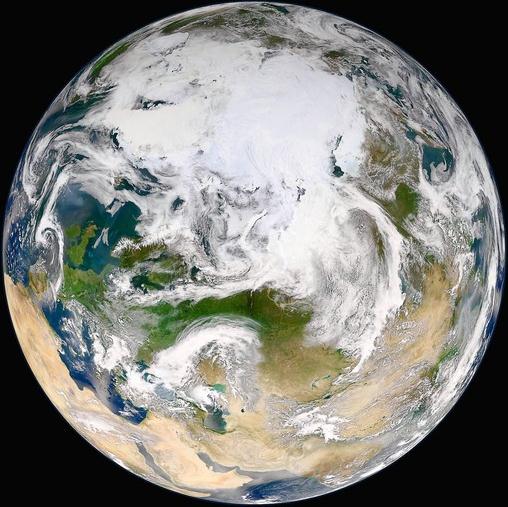 No Denying It. Climate Change Is Real. Liberals, Conservatives - Let's Deal With It. Here's an excerpt of an Op-Ed at The Chicago Tribune: "It's
official: July was the hottest month in the continental U.S. since the
government began keeping those records in 1895. Chicagoans, who
sweated through 18 days of 90-plus heat, probably aren't surprised. For
years, scientists have warned that climate change is happening. They
reached that conclusion not because of a hot summer like this one, but
from decades of data that show slowly rising temperatures. In 2010, the
National Academy of Sciences unequivocally warned: "A strong, credible
body of scientific evidence shows that climate change is occurring, is
caused largely by human activities, and poses significant risks for a
broad range of human and natural systems."
No Denying It. Climate Change Is Real. Liberals, Conservatives - Let's Deal With It. Here's an excerpt of an Op-Ed at The Chicago Tribune: "It's
official: July was the hottest month in the continental U.S. since the
government began keeping those records in 1895. Chicagoans, who
sweated through 18 days of 90-plus heat, probably aren't surprised. For
years, scientists have warned that climate change is happening. They
reached that conclusion not because of a hot summer like this one, but
from decades of data that show slowly rising temperatures. In 2010, the
National Academy of Sciences unequivocally warned: "A strong, credible
body of scientific evidence shows that climate change is occurring, is
caused largely by human activities, and poses significant risks for a
broad range of human and natural systems."
 Global Warming Conversations Heat Up. Here's an excerpt of an especially poignant (and in my opinion spot-on) Op-Ed at greenvilleonline.com: "The
atmosphere is changing — not just the one that creates our weather,
but the one in which we’re talking about climate change. For years,
fossil fuel interests made global warming such a charged political
issue that people avoided the topic. But as the effects of a warming
planet multiply, the freeze on climate conversation is thawing as fast
as the glaciers. This summer, I’ve overheard more people discussing
climate change than ever before — in restaurants, coffee shops, and
grocery store lines. You can see a change in the media coverage, too.
Stories aren’t just reporting weather catastrophes; they’re making the
connection to our fossil fuel addiction. The June Associated Press
story entitled “This U.S. summer is ‘what global warming looks like’”
actually ran in a newspaper in tiny Cullman, Ala. You wouldn’t have
seen that a year ago."
Global Warming Conversations Heat Up. Here's an excerpt of an especially poignant (and in my opinion spot-on) Op-Ed at greenvilleonline.com: "The
atmosphere is changing — not just the one that creates our weather,
but the one in which we’re talking about climate change. For years,
fossil fuel interests made global warming such a charged political
issue that people avoided the topic. But as the effects of a warming
planet multiply, the freeze on climate conversation is thawing as fast
as the glaciers. This summer, I’ve overheard more people discussing
climate change than ever before — in restaurants, coffee shops, and
grocery store lines. You can see a change in the media coverage, too.
Stories aren’t just reporting weather catastrophes; they’re making the
connection to our fossil fuel addiction. The June Associated Press
story entitled “This U.S. summer is ‘what global warming looks like’”
actually ran in a newspaper in tiny Cullman, Ala. You wouldn’t have
seen that a year ago."
Photo credit above: "A parched Rutherford County cornfield." Shelley Mays/File/The Tennessean.
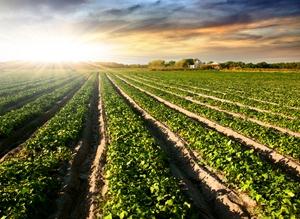 Experts Warn Of Long-Term Climate Change Impacts On Food. Here's a snippet of a story at The Hill: "Experts
working on a food security report for the United Nations warn climate
change will cause disruptions to global food supplies beyond the U.S.
drought this year, according to Reuters.
The researchers note in a forthcoming chapter for the U.N.’s 2014
report on global warming that heat waves and massive downpours will
become more common if nations fail to address climate change. That will
make food supplies more unpredictable, which could cause volatile
prices. "It has not been properly recognized yet that we are dealing
with a food system here. There is a whole chain that is also going to
be affected by climate change," John Porter, a professor of the
University of Copenhagen, was quoted as saying in the Reuters story."
Experts Warn Of Long-Term Climate Change Impacts On Food. Here's a snippet of a story at The Hill: "Experts
working on a food security report for the United Nations warn climate
change will cause disruptions to global food supplies beyond the U.S.
drought this year, according to Reuters.
The researchers note in a forthcoming chapter for the U.N.’s 2014
report on global warming that heat waves and massive downpours will
become more common if nations fail to address climate change. That will
make food supplies more unpredictable, which could cause volatile
prices. "It has not been properly recognized yet that we are dealing
with a food system here. There is a whole chain that is also going to
be affected by climate change," John Porter, a professor of the
University of Copenhagen, was quoted as saying in the Reuters story."
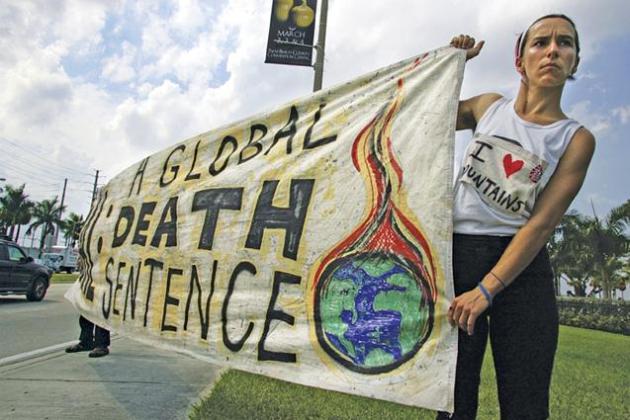 Climate Science As Culture War. Here's an excerpt of a fascinating and (in my opinion) deeply troubling story from Stanford Social Innovation Review: "...Today,
there is no doubt that a scientific consensus exists on the issue of
climate change. Scientists have documented that anthropogenic sources of
greenhouse gases are leading to a buildup in the atmosphere, which
leads to a general warming of the global climate and an alteration in
the statistical distribution of localized weather patterns over long
periods of time. This assessment is endorsed by a large body of
scientific agencies—including every one of the national scientific
agencies of the G8 + 5 countries—and by the vast majority of
climatologists. The majority of research articles published in refereed
scientific journals also support this scientific assessment. Both the US
National Academy of Sciences and the American Association for the
Advancement of Science use the word “consensus” when describing the
state of climate science. And yet a social consensus on climate change
does not exist. Surveys show that the American public’s belief in the
science of climate change has mostly declined over the past five years,
with large percentages of the population remaining skeptical of the
science."
Climate Science As Culture War. Here's an excerpt of a fascinating and (in my opinion) deeply troubling story from Stanford Social Innovation Review: "...Today,
there is no doubt that a scientific consensus exists on the issue of
climate change. Scientists have documented that anthropogenic sources of
greenhouse gases are leading to a buildup in the atmosphere, which
leads to a general warming of the global climate and an alteration in
the statistical distribution of localized weather patterns over long
periods of time. This assessment is endorsed by a large body of
scientific agencies—including every one of the national scientific
agencies of the G8 + 5 countries—and by the vast majority of
climatologists. The majority of research articles published in refereed
scientific journals also support this scientific assessment. Both the US
National Academy of Sciences and the American Association for the
Advancement of Science use the word “consensus” when describing the
state of climate science. And yet a social consensus on climate change
does not exist. Surveys show that the American public’s belief in the
science of climate change has mostly declined over the past five years,
with large percentages of the population remaining skeptical of the
science."
Photo credit above: "South Florida Earth First members protest outside the Platts Coal Properties and Investment Conference in West Palm Beach." (Photo by Bruce R. Bennett/Zum Press/Newscom
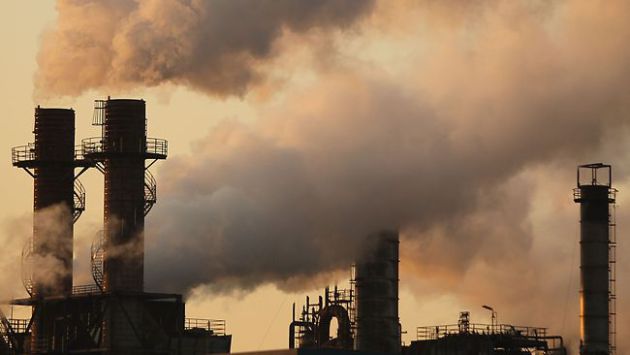 Survey Finds 2 Percent Of Canadians Don't Believe Climate Change Is Happening. Details from The Canadian Press and Yahoo: "REGINA
- Only two per cent of Canadians who responded to a new opinion poll
believe climate change is not occurring. The findings are in a survey
conducted by Insightrix Research, Inc. for IPAC-CO2 Research Inc., a
Regina-based centre that studies carbon capture and storage. The online
poll of 1,550 people was done between May 29 and June 11. The results
were to be released on Wednesday. "Our survey indicates that Canadians
from coast to coast overwhelmingly believe climate change is real and
is occurring, at least in part due to human activity," said centre CEO
Carmen Dybwad."
Survey Finds 2 Percent Of Canadians Don't Believe Climate Change Is Happening. Details from The Canadian Press and Yahoo: "REGINA
- Only two per cent of Canadians who responded to a new opinion poll
believe climate change is not occurring. The findings are in a survey
conducted by Insightrix Research, Inc. for IPAC-CO2 Research Inc., a
Regina-based centre that studies carbon capture and storage. The online
poll of 1,550 people was done between May 29 and June 11. The results
were to be released on Wednesday. "Our survey indicates that Canadians
from coast to coast overwhelmingly believe climate change is real and
is occurring, at least in part due to human activity," said centre CEO
Carmen Dybwad."
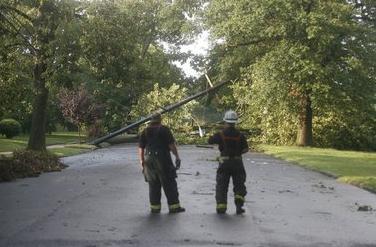 Opinion: Severe Storms Prompted By Climate Change Require New Development Policies. Here's an excerpt of an Op-Ed an NJ.com in New Jersey that caught my eye: "...Increased
flooding also changes the aquatic ecological systems by changing
spawning cycles, increasing the amount of sedimentation in streams and
rivers (thereby reducing available oxygen and blanketing stream beds
with sediment), and increasing the harmful impacts of runoff of
fertilizers, pesticides and other pollutants, all resulting in loss of
aquatic life. Storms of greater intensity do more damage to trees and
other vegetation. They also over-saturate the soil, leading to weakened
roots. Too much water can kill vegetation as much as can too little
water. Soil saturation leads to basement flooding and unstable soil
conditions, which may result in more sinkholes and problems with
building foundations. There could also be impacts to septic systems
that rely on the soil to remove and dispose of pollutants. Homes,
buildings and roadways built near the coast, in flood plains or on
poorly drained soils will most likely see an increase in problems due
to these storms. However, all of us are likely to face additional
complications from this trend..."
Opinion: Severe Storms Prompted By Climate Change Require New Development Policies. Here's an excerpt of an Op-Ed an NJ.com in New Jersey that caught my eye: "...Increased
flooding also changes the aquatic ecological systems by changing
spawning cycles, increasing the amount of sedimentation in streams and
rivers (thereby reducing available oxygen and blanketing stream beds
with sediment), and increasing the harmful impacts of runoff of
fertilizers, pesticides and other pollutants, all resulting in loss of
aquatic life. Storms of greater intensity do more damage to trees and
other vegetation. They also over-saturate the soil, leading to weakened
roots. Too much water can kill vegetation as much as can too little
water. Soil saturation leads to basement flooding and unstable soil
conditions, which may result in more sinkholes and problems with
building foundations. There could also be impacts to septic systems
that rely on the soil to remove and dispose of pollutants. Homes,
buildings and roadways built near the coast, in flood plains or on
poorly drained soils will most likely see an increase in problems due
to these storms. However, all of us are likely to face additional
complications from this trend..."
Photo credit above: "Two Trenton firefighters look at the damage a tree caused during a thunderstorm. The tree (on Cadwalader Drive) fell on some wires, causing the pole to fall down."
 Talk Climate Change Solutions, Win Votes: Yale Study. Here's an excerpt of an intriguing story from treehugger.com: "Conventional
beltway wisdom holds that if you're running for office, you don't
touch climate with a ten foot pole. It's considered "politically
toxic," albeit by a cohort that tolerates birtherism and Donald Trump
participating in the political process. So unless you're gunning to
represent one of those wacky radical leftist states like Vermont or
California or Massachusetts, any meaningful engagement on climate
issues is off the table. The politicos say so. Obama took the hint; he
almost never mentions global warming in public. Romney's mum, too. But new Yale research
(pdf) says that conventional wisdom is probably wrong. A new study
from the Yale Project on Climate Change Communication finds that there
are indeed a group of climate issues voters who will be more likely to
support a candidate who's pro-climate."
Talk Climate Change Solutions, Win Votes: Yale Study. Here's an excerpt of an intriguing story from treehugger.com: "Conventional
beltway wisdom holds that if you're running for office, you don't
touch climate with a ten foot pole. It's considered "politically
toxic," albeit by a cohort that tolerates birtherism and Donald Trump
participating in the political process. So unless you're gunning to
represent one of those wacky radical leftist states like Vermont or
California or Massachusetts, any meaningful engagement on climate
issues is off the table. The politicos say so. Obama took the hint; he
almost never mentions global warming in public. Romney's mum, too. But new Yale research
(pdf) says that conventional wisdom is probably wrong. A new study
from the Yale Project on Climate Change Communication finds that there
are indeed a group of climate issues voters who will be more likely to
support a candidate who's pro-climate."
Photo credit above: Wikimedia Commons/CC BY 2.0
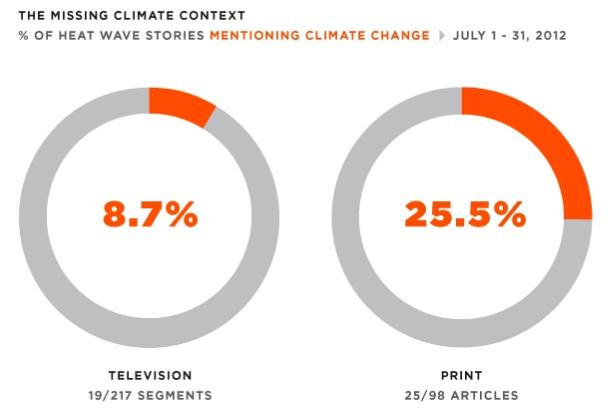 Study: TV Media Ignore Climate Change In Coverage Of Record July Heat Wave. Here's an excerpt from Media Matters: "Scientists
say that human-induced climate change made this year's record heat
more likely, and project that extreme heat will become more common in
the United States. But a Media Matters analysis of media coverage of
record-breaking heat in July finds that major television outlets rarely
made the connection between heat waves and a changing climate. Only 14% Of Heat Wave Stories Mentioned Climate Change. In
a study of major media outlets, only 8.7% of television segments and
25.5% of print articles reported on record-breaking July heat waves in
the context of climate change."
Study: TV Media Ignore Climate Change In Coverage Of Record July Heat Wave. Here's an excerpt from Media Matters: "Scientists
say that human-induced climate change made this year's record heat
more likely, and project that extreme heat will become more common in
the United States. But a Media Matters analysis of media coverage of
record-breaking heat in July finds that major television outlets rarely
made the connection between heat waves and a changing climate. Only 14% Of Heat Wave Stories Mentioned Climate Change. In
a study of major media outlets, only 8.7% of television segments and
25.5% of print articles reported on record-breaking July heat waves in
the context of climate change."
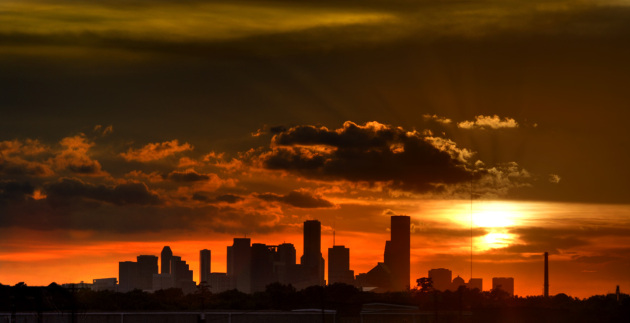 Urban Heat Island Effect And Climate Change May Cause Scorching Summer Temperatures.
It's a potential double-whammy: excess heat radiating up from concrete
and asphalt, coupled with warming background temperatures. Here's an
excerpt of a story from Climate Central and Huffington Post: "For
scientists who worry about climate change, cities are just plain
annoying. The acres of asphalt that cover roads and parking lots and
roofs absorb enormous amounts of heat. In the summer, whirring air
conditioners channel even more heat out of buildings and into the air. Climate scientists have to subtract this so-called urban heat island effect
from their calculations if they want to get a true picture of how
greenhouse gas emissions are warming the planet. For people who actually
live in cities, however the urban heat island effect is more than just
a mathematical annoyance. If you’re sweltering on a hot summer day,
your body doesn’t much care where the heat is coming from. And
according to a paper just published in Nature Climate Change,
urbanization alone could drive local temperatures up by a whopping 7°F
by 2050 in some parts of the U.S. — some two or three times higher
than the effects of global warming (which would also be going on at the
same time)."
Urban Heat Island Effect And Climate Change May Cause Scorching Summer Temperatures.
It's a potential double-whammy: excess heat radiating up from concrete
and asphalt, coupled with warming background temperatures. Here's an
excerpt of a story from Climate Central and Huffington Post: "For
scientists who worry about climate change, cities are just plain
annoying. The acres of asphalt that cover roads and parking lots and
roofs absorb enormous amounts of heat. In the summer, whirring air
conditioners channel even more heat out of buildings and into the air. Climate scientists have to subtract this so-called urban heat island effect
from their calculations if they want to get a true picture of how
greenhouse gas emissions are warming the planet. For people who actually
live in cities, however the urban heat island effect is more than just
a mathematical annoyance. If you’re sweltering on a hot summer day,
your body doesn’t much care where the heat is coming from. And
according to a paper just published in Nature Climate Change,
urbanization alone could drive local temperatures up by a whopping 7°F
by 2050 in some parts of the U.S. — some two or three times higher
than the effects of global warming (which would also be going on at the
same time)."
 Leading By Example: The Dutch Prepare For Climate Change. Here's an excerpt of an interesting article at opednews.com: "...The
Netherlands is a country particularly vulnerable to rising sea levels,
as two-thirds of its population lives below sea level. Throughout its
history, the Dutch have understood the inevitability of change and how
society must work with nature for effective strategies. In 2007, the
Dutch began preparing for the changing climate in the upcoming two
hundred years. They recognize that their nation will continue to combat
rising seas, and must act expeditiously in order to prevent further
encroachment. In State of the World 2012,
Erik Assadourian outlines the 200-year plan put forth by the Dutch,
describing their strategy to spend $1 billion a year on climate change
adaptation. Through such policies, it is clear that the Netherlands is
focused on the long-term public interest and not short-term private
interests. The Dutch plan
combines innovative techniques like building surge barriers and
extending the coastline, with more traditional methods, such as
fortifying levees."
Leading By Example: The Dutch Prepare For Climate Change. Here's an excerpt of an interesting article at opednews.com: "...The
Netherlands is a country particularly vulnerable to rising sea levels,
as two-thirds of its population lives below sea level. Throughout its
history, the Dutch have understood the inevitability of change and how
society must work with nature for effective strategies. In 2007, the
Dutch began preparing for the changing climate in the upcoming two
hundred years. They recognize that their nation will continue to combat
rising seas, and must act expeditiously in order to prevent further
encroachment. In State of the World 2012,
Erik Assadourian outlines the 200-year plan put forth by the Dutch,
describing their strategy to spend $1 billion a year on climate change
adaptation. Through such policies, it is clear that the Netherlands is
focused on the long-term public interest and not short-term private
interests. The Dutch plan
combines innovative techniques like building surge barriers and
extending the coastline, with more traditional methods, such as
fortifying levees."
Photo credit above: "Old Dutch canal." (Photo via Flickr, by Joepydo)
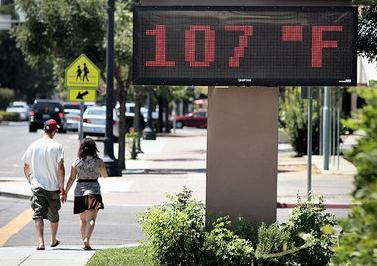 Methane From Fracking Triggers Climate Change. From
what I understand about hydro-fracking, an important (and in my humble
opinion - vital) energy source for America going forward, with far less
greenhouse gas emissions than coal or oil, it would cost an additional
7% for operators to clean up fracking operations, so they won't pollute
groundwater supplies or leak methane from drilling sites. There is a lot
of concern about the environmental impacts of "fracking". Here's an
excerpt of an Op-Ed at syracuse.com: "Far
from being a climate solution, fracking may be a disaster for our
climate. Research indicates the methane leakage may mean that fracking
is worse for the climate than coal and oil, particularly in the short
term. Gas from fracking is mostly methane, a dangerous greenhouse gas
that is up to 105 times more powerful at trapping heat in the
atmosphere than carbon dioxide over 20 years. A recent United Nations
Environment Program report shows that it is more urgent to reduce
methane than CO2, given that methane is so much more powerful, has
quicker climate impacts and will trigger runaway climate change sooner.
According to the Nobel-prize-winning Intergovernmental Panel on
Climate Change, we must immediately reduce our greenhouse gas emissions
to avoid dangerous tipping points for the climate. Failing to do so
will cause catastrophic impacts, far worse than the extreme heat and
droughts this summer."
Methane From Fracking Triggers Climate Change. From
what I understand about hydro-fracking, an important (and in my humble
opinion - vital) energy source for America going forward, with far less
greenhouse gas emissions than coal or oil, it would cost an additional
7% for operators to clean up fracking operations, so they won't pollute
groundwater supplies or leak methane from drilling sites. There is a lot
of concern about the environmental impacts of "fracking". Here's an
excerpt of an Op-Ed at syracuse.com: "Far
from being a climate solution, fracking may be a disaster for our
climate. Research indicates the methane leakage may mean that fracking
is worse for the climate than coal and oil, particularly in the short
term. Gas from fracking is mostly methane, a dangerous greenhouse gas
that is up to 105 times more powerful at trapping heat in the
atmosphere than carbon dioxide over 20 years. A recent United Nations
Environment Program report shows that it is more urgent to reduce
methane than CO2, given that methane is so much more powerful, has
quicker climate impacts and will trigger runaway climate change sooner.
According to the Nobel-prize-winning Intergovernmental Panel on
Climate Change, we must immediately reduce our greenhouse gas emissions
to avoid dangerous tipping points for the climate. Failing to do so
will cause catastrophic impacts, far worse than the extreme heat and
droughts this summer."
Photo credit above: . "A sign on a building Friday reads 107 degrees in Clovis, Calif. A recent United Nations Environment Program report shows the need to reduce methane, which is released by fracking, since the gas traps heat in the atmosphere."
It's way too early to write off summer.
Climate Stories...



Photo credit above: "A parched Rutherford County cornfield." Shelley Mays/File/The Tennessean.


Photo credit above: "South Florida Earth First members protest outside the Platts Coal Properties and Investment Conference in West Palm Beach." (Photo by Bruce R. Bennett/Zum Press/Newscom


Photo credit above: "Two Trenton firefighters look at the damage a tree caused during a thunderstorm. The tree (on Cadwalader Drive) fell on some wires, causing the pole to fall down."

Photo credit above: Wikimedia Commons/CC BY 2.0



Photo credit above: "Old Dutch canal." (Photo via Flickr, by Joepydo)

Photo credit above: . "A sign on a building Friday reads 107 degrees in Clovis, Calif. A recent United Nations Environment Program report shows the need to reduce methane, which is released by fracking, since the gas traps heat in the atmosphere."
No comments:
Post a Comment